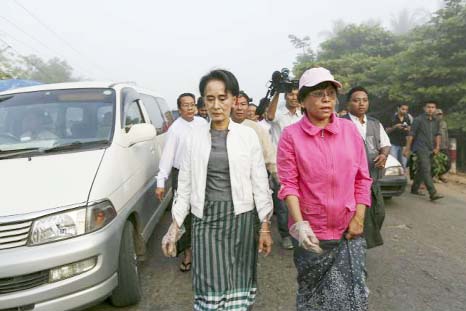
Reuters, Naypyitaw :
When Myanmar’s Aung San Suu Kyi spoke warmly on a recent radio show about a critical meeting that followed her landslide election victory, she was referring to talks with the very man who had detained her for 15 years.
Listeners might have been surprised by the Nobel peace laureate’s gentle tone toward Than Shwe, former head of the junta that ruled Myanmar for nearly half a century.
But it was just one of several conciliatory gestures Suu Kyi has made toward her one-time enemies since the Nov. 8 poll, underlining her transformation from persecuted democracy icon to pragmatic politician.
Her readiness to forge alliances with even those she once reviled could augur well for Myanmar, no longer a global pariah but still a country fraught with political risk as Suu Kyi’s National League for Democracy (NLD) and the military prepare to share power.
“We should think of working for the emergence of a brighter future based on the present situation, instead of thinking why we didn’t do it in the past,” Suu Kyi said after meeting Than Shwe, whose regime kept her locked up in her lakeside Yangon home and prevented her dying British husband from visiting Myanmar.
In the month since her election triumph, the 70-year-old Suu Kyi has also held talks – cordial, according to media reports – with President Thein Sein, a former military commander, and armed forces chief Min Aung Hlaing.
In other mollifying moves, she has called on her supporters to restrain their victory celebrations and warned NLD lawmakers not to call themselves “winners” in media interviews.
“It’s about smoothening the way,” said analyst Richard Horsey, a former senior United Nations official in Myanmar. “It’s about building relationships and political positioning, which is very important.”
The events suggest that Suu Kyi, who often comes across as stern and uncompromising, is settling into realpolitik.
The army’s powers have not substantially diminished since a shift to semi-civilian rule in 2011: Under the constitution, it is guaranteed 25 percent of the seats in parliament, and controls three big-budget and powerful ministries.
Than Shwe resigned as head of state and army chief in 2011 and stepped away from active politics, but diplomats and observers say he retains enough clout to make the closed-door appointment with Suu Kyi a major step in easing her party’s formation of government.
“It is the truth that she will become the future leader of the country. I will support her with all of my efforts,” the former dictator was quoted as saying by his grandson Nay Shwe Thway Aung after the meeting.
When Myanmar’s Aung San Suu Kyi spoke warmly on a recent radio show about a critical meeting that followed her landslide election victory, she was referring to talks with the very man who had detained her for 15 years.
Listeners might have been surprised by the Nobel peace laureate’s gentle tone toward Than Shwe, former head of the junta that ruled Myanmar for nearly half a century.
But it was just one of several conciliatory gestures Suu Kyi has made toward her one-time enemies since the Nov. 8 poll, underlining her transformation from persecuted democracy icon to pragmatic politician.
Her readiness to forge alliances with even those she once reviled could augur well for Myanmar, no longer a global pariah but still a country fraught with political risk as Suu Kyi’s National League for Democracy (NLD) and the military prepare to share power.
“We should think of working for the emergence of a brighter future based on the present situation, instead of thinking why we didn’t do it in the past,” Suu Kyi said after meeting Than Shwe, whose regime kept her locked up in her lakeside Yangon home and prevented her dying British husband from visiting Myanmar.
In the month since her election triumph, the 70-year-old Suu Kyi has also held talks – cordial, according to media reports – with President Thein Sein, a former military commander, and armed forces chief Min Aung Hlaing.
In other mollifying moves, she has called on her supporters to restrain their victory celebrations and warned NLD lawmakers not to call themselves “winners” in media interviews.
“It’s about smoothening the way,” said analyst Richard Horsey, a former senior United Nations official in Myanmar. “It’s about building relationships and political positioning, which is very important.”
The events suggest that Suu Kyi, who often comes across as stern and uncompromising, is settling into realpolitik.
The army’s powers have not substantially diminished since a shift to semi-civilian rule in 2011: Under the constitution, it is guaranteed 25 percent of the seats in parliament, and controls three big-budget and powerful ministries.
Than Shwe resigned as head of state and army chief in 2011 and stepped away from active politics, but diplomats and observers say he retains enough clout to make the closed-door appointment with Suu Kyi a major step in easing her party’s formation of government.
“It is the truth that she will become the future leader of the country. I will support her with all of my efforts,” the former dictator was quoted as saying by his grandson Nay Shwe Thway Aung after the meeting.

